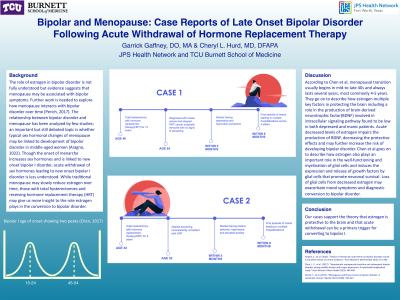Women's Mental Health
Session: Poster Session
(209) Bipolar and Menopause: Case Reports of Late Onset Bipolar Disorder Following Acute Withdrawal of Hormone Replacement Therapy

Trainee Involvement: Yes

Garrick Gaffney, DO, MA (he/him/his)
Resident, PGY-3
John Peter Smith Hospital, Psychiatry Residency Program
Fort Worth, Texas, United States
Cheryl L. Hurd, MD, DFAPA
Physician Development Coach
TCU Burnett School of Medicine
Fort Worth, Texas, United States
Presenting Author(s)
Co-Author(s)
Title:
Bipolar and Menopause: Case Reports of Late Onset Bipolar Disorder Following Acute Withdrawal of Hormone Replacement Therapy
The role of estrogen in bipolar disorder is not fully understood but evidence suggests that menopause may be associated with bipolar symptoms. Further work is needed to explore how menopause interacts with bipolar disorder over time (Perich, 2017). The relationship between bipolar disorder and menopause has been analyzed by few studies; an important but still debated topic is whether typical sex hormonal changes of menopause may be linked to the development of bipolar disorder in middle-aged women (Aragno, 2022). Though the onset of menarche increases sex hormones and is linked to new onset bipolar I disorder, acute withdrawal of sex hormones leading to new onset bipolar I disorder is less understood. While traditional menopause may slowly reduce estrogen over time, those with total hysterectomies and receiving hormone replacement therapy (HRT) may give us more insight into the role estrogen plays in the conversion to bipolar disorder. Case 1: A 54-year-old woman with a history of a total hysterectomy at age 40, started on HRT and continued taking it for 14 years. She was diagnosed with breast cancer and had to stop taking HRT. Within 2 months of stopping, she had depressive symptoms followed by irritability and increasing hypomania. Approximately 6 months after stopping HRT she had her first manic episode with psychotic features leading to multiple hospitalizations for bipolar 1 disorder. Case 2: A 52-year-old woman with a history of a total hysterectomy at age 42, started on HRT and continued taking it for 9 years. She became inconsistently compliant over a 5-month period and started having bizarre behaviors, reduced need for sleep, and increased anxiety. Within 3 months of her last known dose of HRT, she had her first manic episode with psychotic features leading to multiple hospitalizations for bipolar 1 disorder. Some studies have shown there to be two peaks in the age of onset of bipolar 1 disorder with the second being between 45-54 years old. It is theorized that estrogen is protective in the brain but when withdrawn, it has been connected to the loss of glial cells, a decrease in brain-derived neurotrophic factor, and increases in proinflammatory cytokines, all linked to bipolar disorder (Chen, 2017). Our cases support the theory that estrogen is protective of the brain and that acute withdrawal can be a primary trigger for converting to bipolar 1 disorder. Aragno, E., et al. (2022). "Impact of menstrual cycle events on bipolar disorder course: A narrative review of current evidence." Arch Women’s Ment Health 25(2): 257-266 Chen, L. C., et al. (2017). "Symptomatic menopausal transition and subsequent bipolar disorder among midlife women with major depression: A nationwide longitudinal study." Arch Women’s Ment Health 20(3): 463-468 Perich, T., et al. (2017). "Menopause and illness course in bipolar disorder: A systematic review." Bipolar Disord 19(6): 434-443
Background:
Discussion:
Conclusion:
References:

